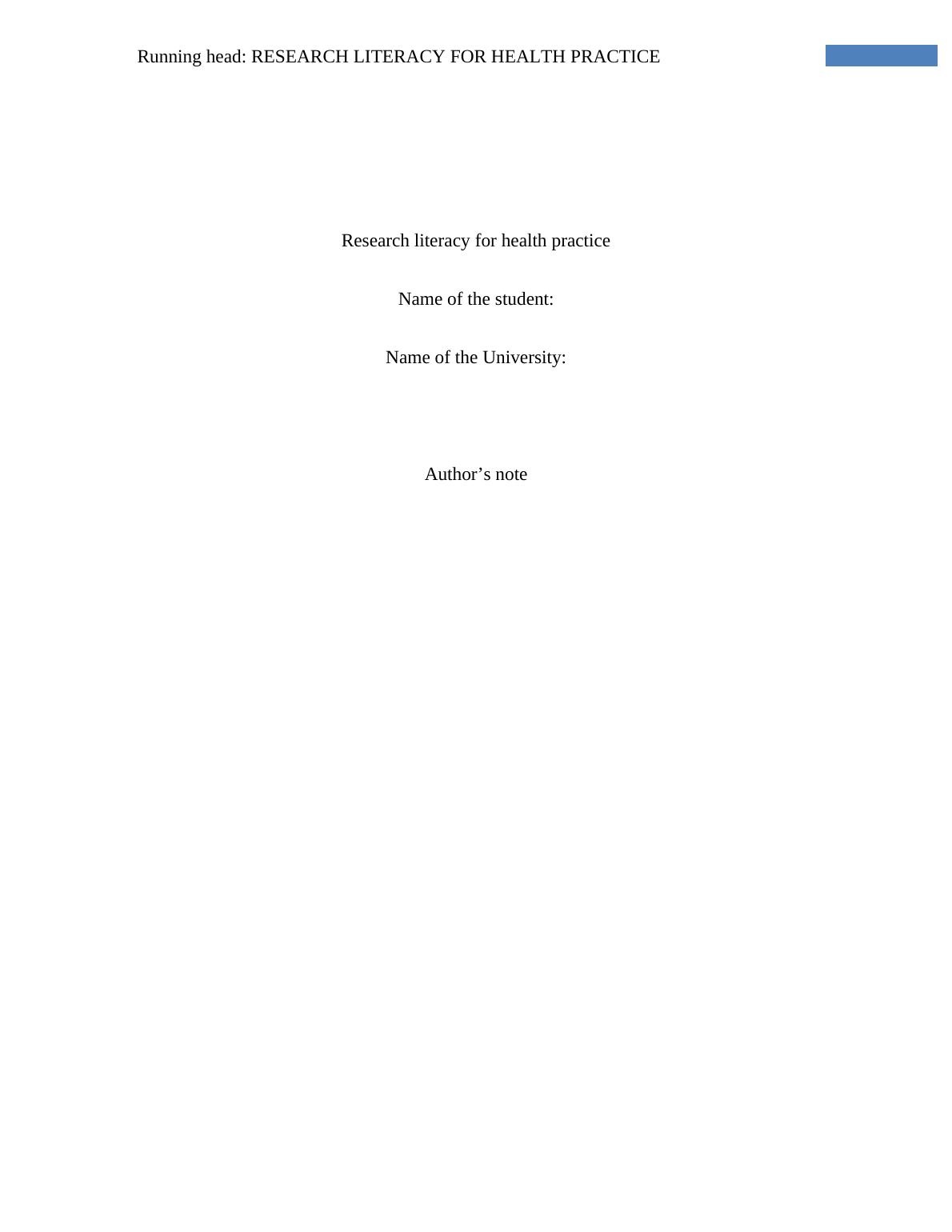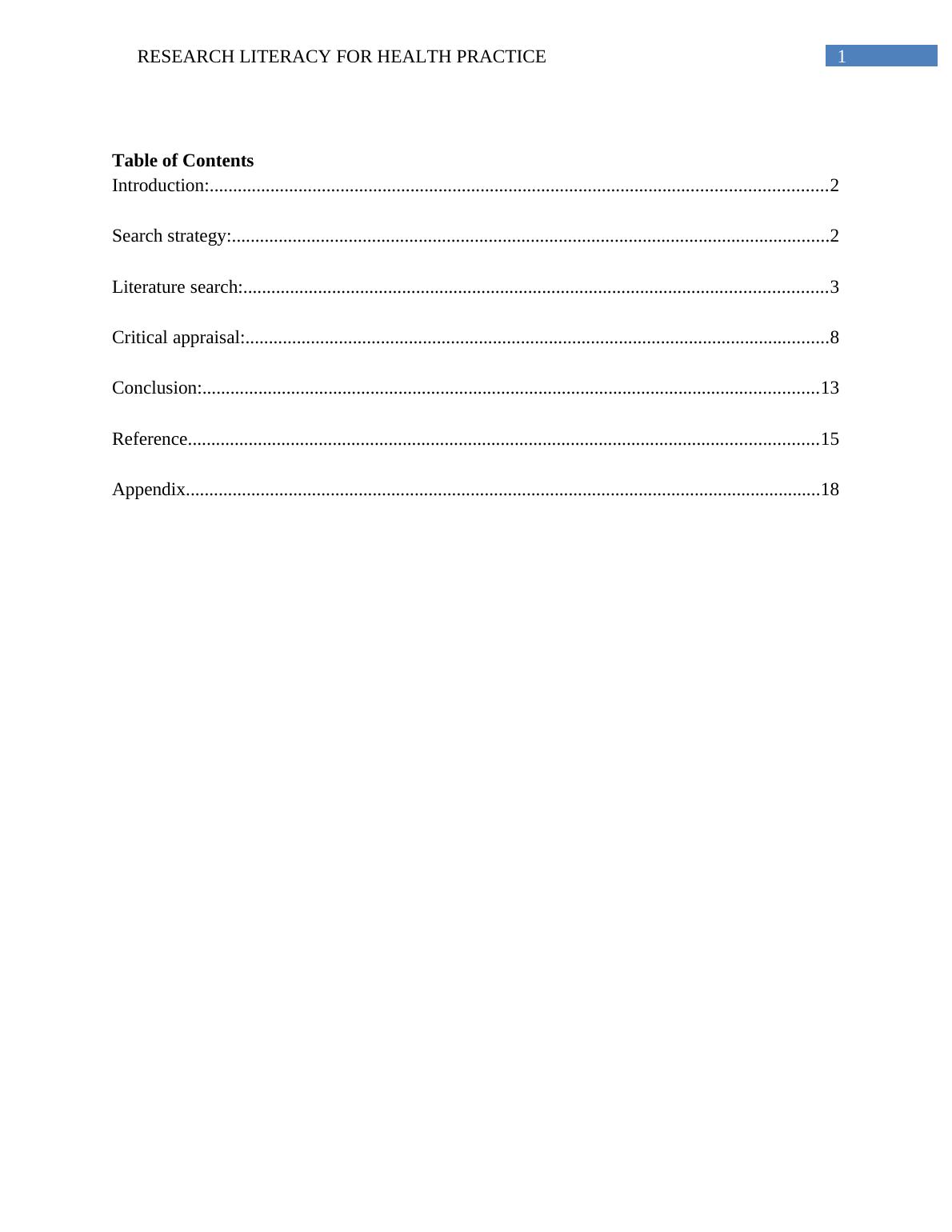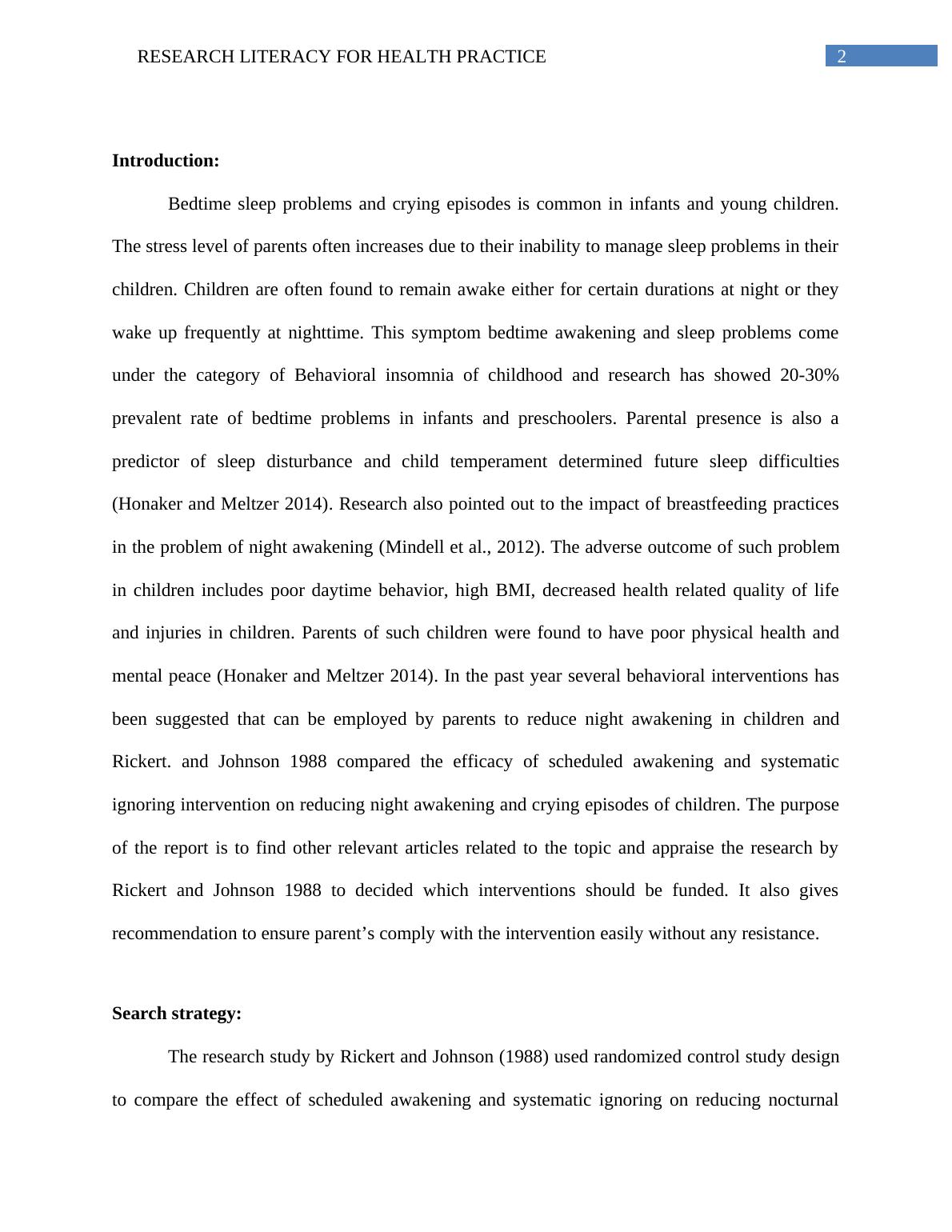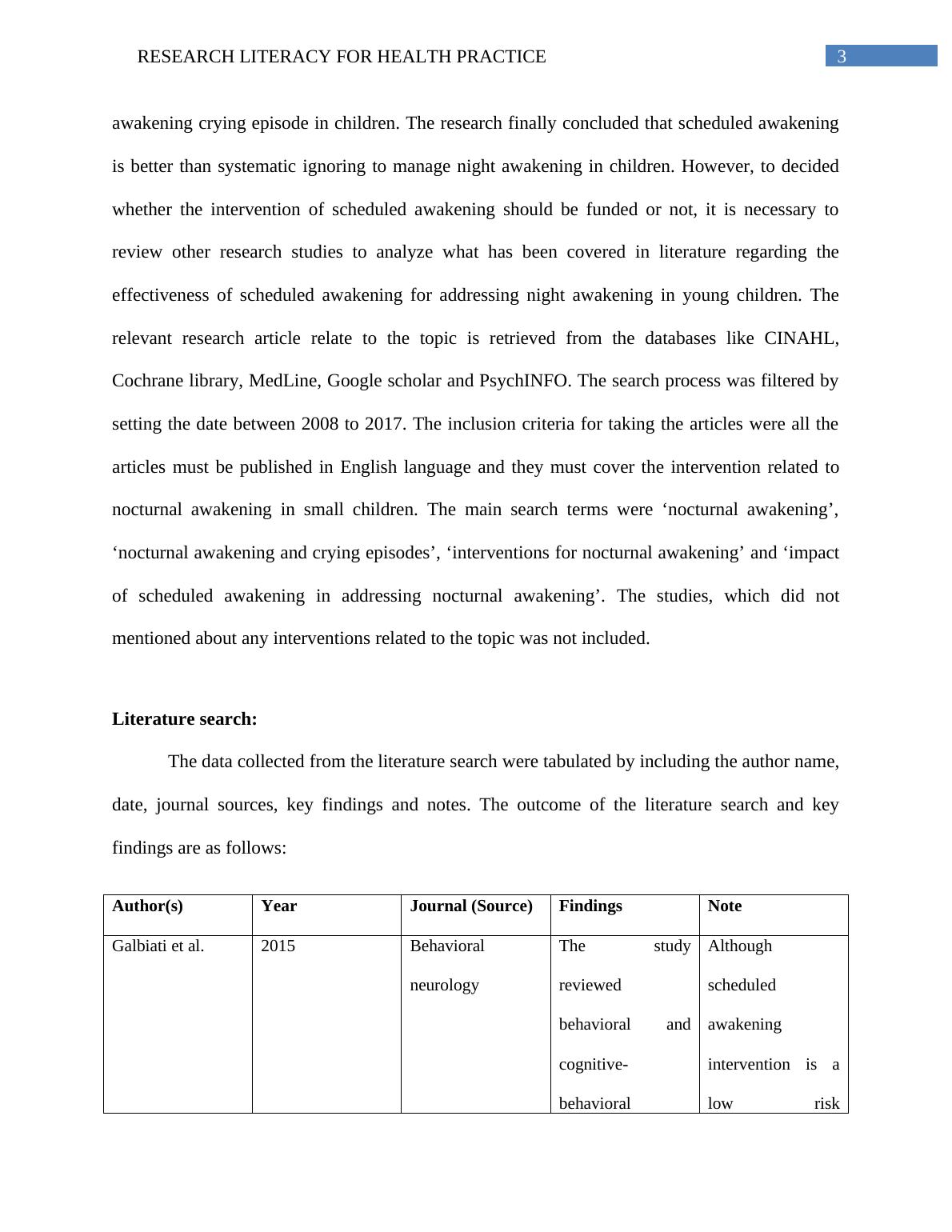Research Literacy for Health Practice Assignment
17 Pages3750 Words38 Views
Added on 2020-04-01
Research Literacy for Health Practice Assignment
Added on 2020-04-01
ShareRelated Documents
Running head: RESEARCH LITERACY FOR HEALTH PRACTICE
Research literacy for health practice
Name of the student:
Name of the University:
Author’s note
Research literacy for health practice
Name of the student:
Name of the University:
Author’s note

1RESEARCH LITERACY FOR HEALTH PRACTICE
Table of Contents
Introduction:....................................................................................................................................2
Search strategy:................................................................................................................................2
Literature search:.............................................................................................................................3
Critical appraisal:.............................................................................................................................8
Conclusion:....................................................................................................................................13
Reference.......................................................................................................................................15
Appendix........................................................................................................................................18
Table of Contents
Introduction:....................................................................................................................................2
Search strategy:................................................................................................................................2
Literature search:.............................................................................................................................3
Critical appraisal:.............................................................................................................................8
Conclusion:....................................................................................................................................13
Reference.......................................................................................................................................15
Appendix........................................................................................................................................18

2RESEARCH LITERACY FOR HEALTH PRACTICE
Introduction:
Bedtime sleep problems and crying episodes is common in infants and young children.
The stress level of parents often increases due to their inability to manage sleep problems in their
children. Children are often found to remain awake either for certain durations at night or they
wake up frequently at nighttime. This symptom bedtime awakening and sleep problems come
under the category of Behavioral insomnia of childhood and research has showed 20-30%
prevalent rate of bedtime problems in infants and preschoolers. Parental presence is also a
predictor of sleep disturbance and child temperament determined future sleep difficulties
(Honaker and Meltzer 2014). Research also pointed out to the impact of breastfeeding practices
in the problem of night awakening (Mindell et al., 2012). The adverse outcome of such problem
in children includes poor daytime behavior, high BMI, decreased health related quality of life
and injuries in children. Parents of such children were found to have poor physical health and
mental peace (Honaker and Meltzer 2014). In the past year several behavioral interventions has
been suggested that can be employed by parents to reduce night awakening in children and
Rickert. and Johnson 1988 compared the efficacy of scheduled awakening and systematic
ignoring intervention on reducing night awakening and crying episodes of children. The purpose
of the report is to find other relevant articles related to the topic and appraise the research by
Rickert and Johnson 1988 to decided which interventions should be funded. It also gives
recommendation to ensure parent’s comply with the intervention easily without any resistance.
Search strategy:
The research study by Rickert and Johnson (1988) used randomized control study design
to compare the effect of scheduled awakening and systematic ignoring on reducing nocturnal
Introduction:
Bedtime sleep problems and crying episodes is common in infants and young children.
The stress level of parents often increases due to their inability to manage sleep problems in their
children. Children are often found to remain awake either for certain durations at night or they
wake up frequently at nighttime. This symptom bedtime awakening and sleep problems come
under the category of Behavioral insomnia of childhood and research has showed 20-30%
prevalent rate of bedtime problems in infants and preschoolers. Parental presence is also a
predictor of sleep disturbance and child temperament determined future sleep difficulties
(Honaker and Meltzer 2014). Research also pointed out to the impact of breastfeeding practices
in the problem of night awakening (Mindell et al., 2012). The adverse outcome of such problem
in children includes poor daytime behavior, high BMI, decreased health related quality of life
and injuries in children. Parents of such children were found to have poor physical health and
mental peace (Honaker and Meltzer 2014). In the past year several behavioral interventions has
been suggested that can be employed by parents to reduce night awakening in children and
Rickert. and Johnson 1988 compared the efficacy of scheduled awakening and systematic
ignoring intervention on reducing night awakening and crying episodes of children. The purpose
of the report is to find other relevant articles related to the topic and appraise the research by
Rickert and Johnson 1988 to decided which interventions should be funded. It also gives
recommendation to ensure parent’s comply with the intervention easily without any resistance.
Search strategy:
The research study by Rickert and Johnson (1988) used randomized control study design
to compare the effect of scheduled awakening and systematic ignoring on reducing nocturnal

3RESEARCH LITERACY FOR HEALTH PRACTICE
awakening crying episode in children. The research finally concluded that scheduled awakening
is better than systematic ignoring to manage night awakening in children. However, to decided
whether the intervention of scheduled awakening should be funded or not, it is necessary to
review other research studies to analyze what has been covered in literature regarding the
effectiveness of scheduled awakening for addressing night awakening in young children. The
relevant research article relate to the topic is retrieved from the databases like CINAHL,
Cochrane library, MedLine, Google scholar and PsychINFO. The search process was filtered by
setting the date between 2008 to 2017. The inclusion criteria for taking the articles were all the
articles must be published in English language and they must cover the intervention related to
nocturnal awakening in small children. The main search terms were ‘nocturnal awakening’,
‘nocturnal awakening and crying episodes’, ‘interventions for nocturnal awakening’ and ‘impact
of scheduled awakening in addressing nocturnal awakening’. The studies, which did not
mentioned about any interventions related to the topic was not included.
Literature search:
The data collected from the literature search were tabulated by including the author name,
date, journal sources, key findings and notes. The outcome of the literature search and key
findings are as follows:
Author(s) Year Journal
(Source)
Findings Note
Galbiati et al. 2015 Behavioral
neurology
The study
reviewed
behavioral and
Although
scheduled
awakening
awakening crying episode in children. The research finally concluded that scheduled awakening
is better than systematic ignoring to manage night awakening in children. However, to decided
whether the intervention of scheduled awakening should be funded or not, it is necessary to
review other research studies to analyze what has been covered in literature regarding the
effectiveness of scheduled awakening for addressing night awakening in young children. The
relevant research article relate to the topic is retrieved from the databases like CINAHL,
Cochrane library, MedLine, Google scholar and PsychINFO. The search process was filtered by
setting the date between 2008 to 2017. The inclusion criteria for taking the articles were all the
articles must be published in English language and they must cover the intervention related to
nocturnal awakening in small children. The main search terms were ‘nocturnal awakening’,
‘nocturnal awakening and crying episodes’, ‘interventions for nocturnal awakening’ and ‘impact
of scheduled awakening in addressing nocturnal awakening’. The studies, which did not
mentioned about any interventions related to the topic was not included.
Literature search:
The data collected from the literature search were tabulated by including the author name,
date, journal sources, key findings and notes. The outcome of the literature search and key
findings are as follows:
Author(s) Year Journal
(Source)
Findings Note
Galbiati et al. 2015 Behavioral
neurology
The study
reviewed
behavioral and
Although
scheduled
awakening

End of preview
Want to access all the pages? Upload your documents or become a member.
Related Documents
HSH725 - Report on Personal Health Practicelg...
|15
|3586
|220
Critical Analysis using CASP Tool Reportlg...
|16
|3782
|330
Sleep Disorders in Infants Critical Evaluation Reportlg...
|23
|4546
|229
